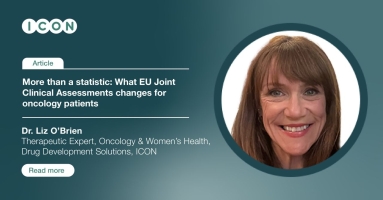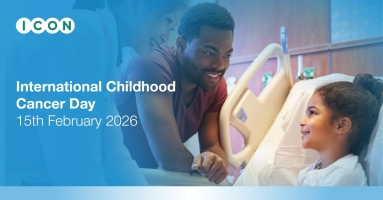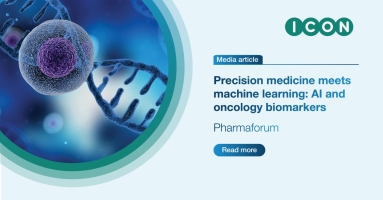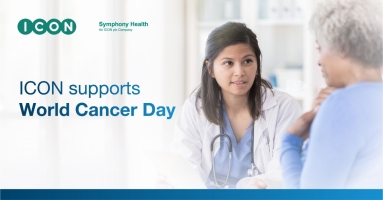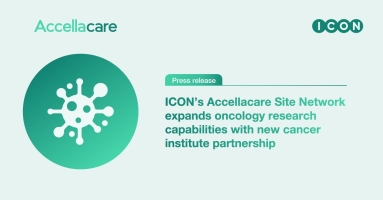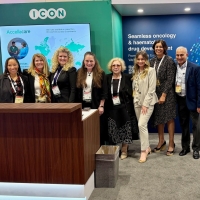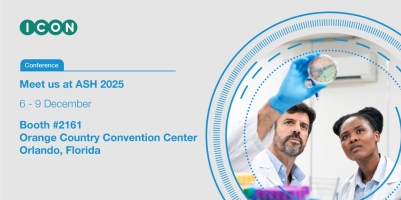The EU Joint Clinical Assessment (#JCA), launched in 2025, is reshaping how oncology and #ATMP trials are designed and assessed across Europe. With 27 EU countries plus Norway, Switzerland, Ukraine and the UK now sharing...
Q&A with one of ICON’s leading scientists
The future of cancer diagnosis and treatment lies in characterising oncology patients by their biomarker profiles. ICON Central Laboratories helps pharmaceutical companies develop cutting-edge biomarker-based techniques for guiding clinical trial recruitment and assessing the performance and value of oncologics.
We spoke with Dr. Chengsen Xue, Ph.D., one of ICON Central Laboratories’ leading scientists, about the latest biomarker-based methods and how they can be leveraged to add value to oncology trials.
(1) Biomarker choice in an immuno-oncology trial is complex, particularly for a number of trials enrolling patients with advanced metastatic cancers. What do developers need to anticipate to ensure the right biomarker strategy is in place?
The selection of the right biomarker profile for an immune-oncology trial is an art as much as it is a science. As drug development becomes increasingly expensive, sponsors are interested in accruing the best available advice during this stage of trial planning. ICON’s biomarker experts, who have extensive experience in molecular biology and a long CRO service history, can provide developers with valuable insights throughout the duration of immune-oncology trials.
Researchers have developed three biomarkers strategies for the development of a new drug candidate. These strategies include:
- Measuring host immune responses through lymphocyte immunophenotyping. A medication can alter the concentration of regulatory T-cells in a patient’s blood, and this can have devastating effects on his or her health. A flow cytometric assay consisting of a panel of fluorochrome-conjugated monoclonal antibodies directed against CD4, CD25 and Foxp3 can monitor this critical cell population in patients’ peripheral blood.
- Receptor occupancy assays. A receptor occupancy assay estimates the amount of drug that is bound to a particular surface marker in a target cell population, and this assay could potential serve as an index of drug efficacy. This test can help elucidate the dose-response relationship.
- Circulating tumour (CTC) assays. This assay is a powerful tool for directly measuring the concentration CTCs, which improves tumour sample accessibility and helps reveal a molecular profile of a tumour for more informed targeting and prognosis.
All of these strategies provide an unprecedented and detailed understanding of clinical biomarkers in oncology.
(2) How can bioanalytical methods be leveraged to add value in early phase studies?
Biomarkers are key to success in modern drug development. By developing a molecular profile of a tumour in early phase studies, we can use the aforementioned strategies to predict the chance that a drug might fail in development.
Since immunophenotyping is sensitive to T-cell markers, it can detect whether a drug is harming a patient’s immune system. With this information, a developer can choose to end a trial early to prevent patients from experiencing adverse reactions to the drug being tested. Receptor occupancy assays could also play a vital role in dose-finding studies. If receptor occupancy is tested early, developers can determine what dose achieves the optimal receptor occupancy level and relate this to the clinical efficacy of the drug.
Also, since we developed the CTC assay five years ago, for example, many developers have reported this assay’s value in predicting survival rates in oncology clinical trials. In an adaptive clinical trial, CTC information could be used as an early indicator for drug candidate efficacy, especially when this information has coalesced into a full mutation profile for the tumour. By measuring CTCs early, a developer can cease a trial as soon as it is revealed that a drug is not efficacious, and this could save millions of dollars in trial costs.
(3) What is the potential for liquid biopsies in immuno-oncology trials?
As whole genomic sequencing becomes more readily available, it can be greatly beneficial to integrate CTC information into clinical decisions. It is reasonable to predict that a CTC test will be included in all future oncology clinical trials because of its value in generating prognoses based on the effectiveness of a drug.
ICON started CTC testing services in 2008. Over the last eight years, the ICON team has accumulated rich experience in integrating this increasingly important biomarker analysis into multiple clinical trials. Using only a simple blood test, ICON directly monitors the presence of CTCs and its relation to survival rate. As the technique continues to evolve and is integrated further with next generation sequencing and big data analytics, the potential of liquid biopsies is being realised.
In 2017 ICON added to our liquid biopsy capability through the validation and implementation of the RareCyte, AccuCyte sample collection and slide preparation for nucleated cells. Utilizing globally standardized equipment and a single operational procedure ICON can quickly, efficiently and with high reproducibility, separate nucleated cells from whole blood and generate uniform slide smears. The major advantage of this technique of is the ability to process samples at our regional labs, and store the prepared slides in -80 C for up to 3 months prior to analysis.
(4) High variability among patient samples and assays can prove challenging for immuno-oncology trials. How do you mitigate that variability?
Since CTC analysis is designed to detect rare events, CTC readout may vary for any given test. It is important, therefore, to look for trends in the data. Developers can minimise this variability by performing CTC assays more frequently during the trial and implementing a strict quality control system. Since ICON developed its CTC assay, the assay has consistent passed quality control tests. One advantage of utilising a central laboratory, such as ICON’s Clinical Laboratories, is that we can ensure that all of our testing processes are standardised, and therefore will generate high quality, consistent data.
(5) For sponsors currently developing an upcoming trial’s protocol and bioanalytical testing methods, what advice would you share?
CROs are a critical player in the modern clinical trial process. Over the years, ICON has given developers access to a variety of experts in every aspect of clinical trials. However, many sponsors still only perceive CROs as “helpful hands,” as they are only brought in later in the development process, after the trial design has been finalised. Once a design reaches the validation stage, it is often too late for a CRO to make any meaningful corrections. I would advise developers to welcome CROs into design process so they can provide their expertise and help design more successful trials.
Oncology insights
ICON's Oncology experts provide analysis including whitepapers, blogs and contributions to media and industry conversations relating to all aspects of oncology in clinical trials.
In this section
-
Digital Disruption
-
Clinical strategies to optimise SaMD for treating mental health
-
Digital Disruption: Surveying the industry's evolving landscape
- AI and clinical trials
-
Clinical trial data anonymisation and data sharing
-
Clinical Trial Tokenisation
-
Closing the evidence gap: The value of digital health technologies in supporting drug reimbursement decisions
- mHealth wearables
-
Personalising Digital Health
- Real World Data
-
The triad of trust: Navigating real-world healthcare data integration
-
Decoding AI in software as a medical device (SaMD)
- Software as a medical device (SaMD)
-
Clinical strategies to optimise SaMD for treating mental health
-
Patient Centricity
-
Accelerating clinical development through DHTs
-
Agile Clinical Monitoring
-
Capturing the voice of the patient in clinical trials
-
Charting the Managed Access Program Landscape
- Representation and inclusion in clinical trials
-
Exploring the patient perspective from different angles
-
Patient safety and pharmacovigilance
-
A guide to safety data migrations
-
Taking safety reporting to the next level with automation
-
Outsourced Pharmacovigilance Affiliate Solution
-
The evolution of the Pharmacovigilance System Master File: Benefits, challenges, and opportunities
-
Sponsor and CRO pharmacovigilance and safety alliances
-
Understanding the Periodic Benefit-Risk Evaluation Report
-
A guide to safety data migrations
-
Patient voice survey
-
Patient Voice Survey - Decentralised and Hybrid Trials
-
Reimagining Patient-Centricity with the Internet of Medical Things (IoMT)
-
Using longitudinal qualitative research to capture the patient voice
-
Prioritising patient-centred research for regulatory approval
-
Accelerating clinical development through DHTs
-
Regulatory Intelligence
-
Accelerating access
-
Meeting requirements for Joint Clinical Assessments
-
Navigating the regulatory landscape in the US and Japan:
-
Preparing for ICH GCP E6(R3) implementation
-
An innovative approach to rare disease clinical development
- EU Clinical Trials Regulation
-
Using innovative tools and lean writing processes to accelerate regulatory document writing
-
Current overview of data sharing within clinical trial transparency
-
Global Agency Meetings: A collaborative approach to drug development
-
Keeping the end in mind: key considerations for creating plain language summaries
-
Navigating orphan drug development from early phase to marketing authorisation
-
Procedural and regulatory know-how for China biotechs in the EU
-
RACE for Children Act
-
Early engagement and regulatory considerations for biotech
-
Regulatory Intelligence Newsletter
-
Requirements & strategy considerations within clinical trial transparency
-
Spotlight on regulatory reforms in China
-
Demystifying EU CTR, MDR and IVDR
-
Transfer of marketing authorisation
-
Exploring FDA guidance for modern Data Monitoring Committees
-
Streamlining dossier preparation
-
Accelerating access
-
Therapeutics insights
-
Endocrine and Metabolic Disorders
- Cardiovascular
- Cell and Gene Therapies
-
Central Nervous System
-
A mind for digital therapeutics
-
Challenges and opportunities in traumatic brain injury clinical trials
-
Challenges and opportunities in Parkinson’s Disease clinical trials
-
Early, precise and efficient; the methods and technologies advancing Alzheimer’s and Parkinson’s R&D
-
Key Considerations in Chronic Pain Clinical Trials
-
ICON survey report: CNS therapeutic development
-
A mind for digital therapeutics
-
Glycomics
- Infectious Diseases
- NASH
- Obesity
- Oncology
- Paediatrics
-
Respiratory
-
Rare and orphan diseases
-
Advanced therapies for rare diseases
-
Cross-border enrollment of rare disease patients
-
Crossing the finish line: Why effective participation support strategy is critical to trial efficiency and success in rare diseases
-
Diversity, equity and inclusion in rare disease clinical trials
-
Identify and mitigate risks to rare disease clinical programmes
-
Leveraging historical data for use in rare disease trials
-
Natural history studies to improve drug development in rare diseases
-
Patient Centricity in Orphan Drug Development
-
The key to remarkable rare disease registries
-
Therapeutic spotlight: Precision medicine considerations in rare diseases
-
Advanced therapies for rare diseases
-
Endocrine and Metabolic Disorders
-
Transforming Trials
-
Accelerating biotech innovation from discovery to commercialisation
-
Demystifying the Systematic Literature Reviews
-
Ensuring the validity of clinical outcomes assessment (COA) data: The value of rater training
-
From bottlenecks to breakthroughs
-
Linguistic validation of Clinical Outcomes Assessments
-
More than monitoring
-
Optimising biotech funding
- Adaptive clinical trials
-
Best practices to increase engagement with medical and scientific poster content
-
Decentralised clinical trials
-
Biopharma perspective: the promise of decentralised models and diversity in clinical trials
-
Decentralised and Hybrid clinical trials
-
Practical considerations in transitioning to hybrid or decentralised clinical trials
-
Navigating the regulatory labyrinth of technology in decentralised clinical trials
-
Biopharma perspective: the promise of decentralised models and diversity in clinical trials
-
eCOA implementation
-
Blended solutions insights
-
Clinical trials in Japan: An enterprise growth and management strategy
-
How investments in supply of CRAs is better than competing with the demand for CRAs
-
The evolution of FSP: not just for large pharma
-
Embracing a blended operating model
-
Observations in outsourcing: Survey results show a blended future
-
Clinical trials in Japan: An enterprise growth and management strategy
-
Implications of COVID-19 on statistical design and analyses of clinical studies
-
Improving pharma R&D efficiency
-
Increasing Complexity and Declining ROI in Drug Development
-
Innovation in Clinical Trial Methodologies
- Partnership insights
-
Risk Based Quality Management
-
Transforming the R&D Model to Sustain Growth
-
Accelerating biotech innovation from discovery to commercialisation
-
Value Based Healthcare
-
Building a comparative evidence base using network meta-analysis
-
Strategies for commercialising oncology treatments for young adults
-
US payers and PROs
-
Accelerated early clinical manufacturing
-
Cardiovascular Medical Devices
-
CMS Part D Price Negotiations: Is your drug on the list?
-
COVID-19 navigating global market access
-
Ensuring scientific rigor in external control arms
-
Evidence Synthesis: A solution to sparse evidence, heterogeneous studies, and disconnected networks
-
Health technology assessment
-
Perspectives from US payers
-
ICER’s impact on payer decision making
-
Making Sense of the Biosimilars Market
-
Medical communications in early phase product development
-
Navigating the Challenges and Opportunities of Value Based Healthcare
-
Payer Reliance on ICER and Perceptions on Value Based Pricing
-
Payers Perspectives on Digital Therapeutics
-
Precision Medicine
-
RWE Generation Cross Sectional Studies and Medical Chart Review
-
Survey results: How to engage healthcare decision-makers
-
The affordability hurdle for gene therapies
-
The Role of ICER as an HTA Organisation
-
Integrating openness and precision for competitive advantage
-
Building a comparative evidence base using network meta-analysis
-
Blog
-
Videos
-
Webinar Channel
